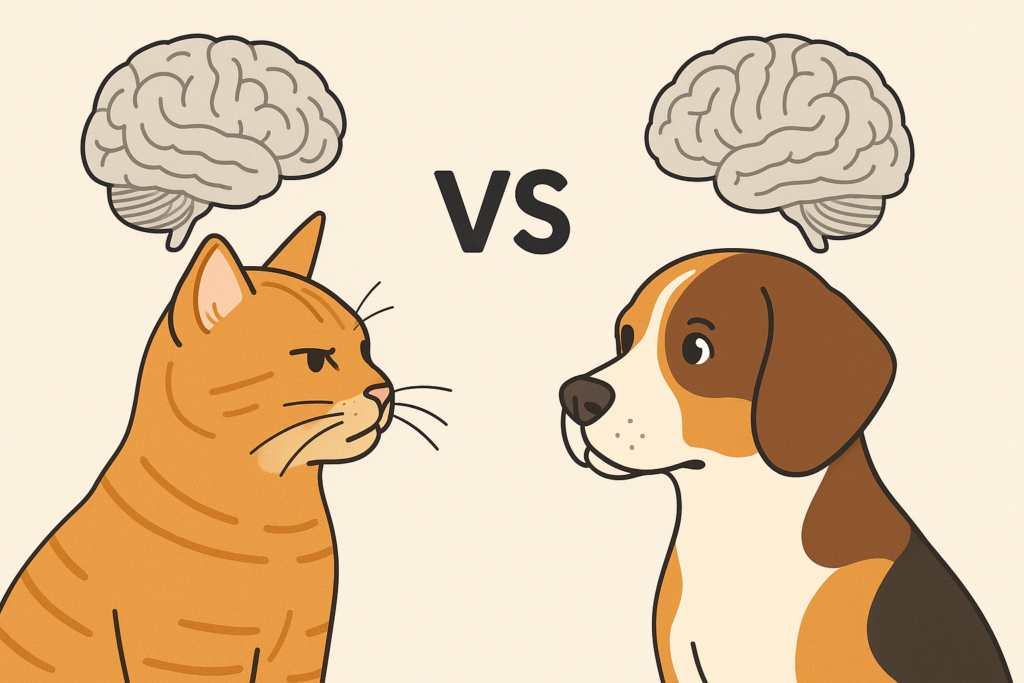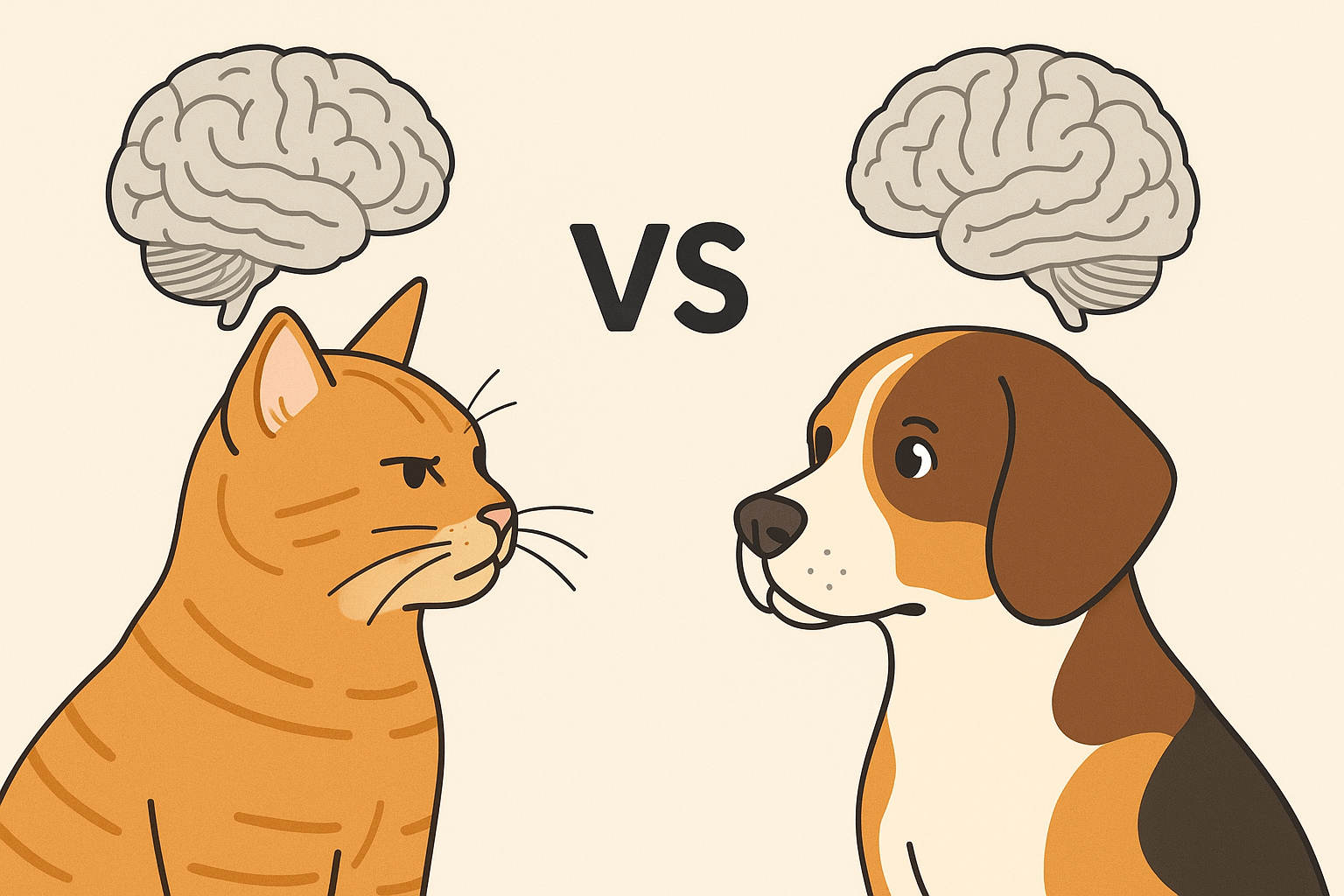Cat IQ vs Dog IQ: Who’s Smarter?
The debate over whether cats or dogs are smarter has been a playful yet intriguing topic among pet lovers for decades. While both animals possess unique cognitive abilities, their intelligence manifests in different ways, making it challenging to declare a clear winner. Cats are often seen as independent and mysterious thinkers, while dogs are celebrated for their social intelligence and trainability. But what does science say about cat IQ versus dog IQ? In this blog post, we’ll explore the fascinating world of animal cognition, comparing the intellectual strengths of our feline and canine companions. By the end, you’ll have a deeper appreciation for the distinct ways these beloved pets navigate the world.
Key Differences Between Cat IQ and Dog IQ
While both cats and dogs exhibit impressive cognitive skills, their intelligence differs based on evolution, behavior, and interaction with humans. Here’s a breakdown of how their IQs compare across various domains.
Problem-Solving Skills:
Cats excel at solving puzzles to access food or escape confined spaces, showcasing their independent problem-solving abilities.Social Intelligence:
Dogs outshine cats in understanding human gestures, such as pointing or facial expressions, due to their long history of domestication.Memory Retention:
Cats have excellent associative memory, remembering locations of food sources or safe hiding spots, but dogs tend to form stronger emotional memories tied to people.Trainability:
Dogs are generally easier to train because they are eager to please and respond well to positive reinforcement, whereas cats prioritize their own interests.Adaptability to New Environments:
Dogs adapt quickly to changes when guided by their owners, while cats may take longer to adjust but thrive once comfortable.
These differences highlight how each species’ intelligence is tailored to its unique role in the animal kingdom and its relationship with humans.

How Scientists Measure Animal Intelligence
Understanding cat and dog IQ requires looking at how researchers assess animal intelligence. Various methods and tests help shed light on their cognitive capabilities.
Observational Studies:
Scientists observe animals in controlled environments to evaluate their problem-solving skills and decision-making processes.Behavioral Experiments:
Tasks like opening doors or retrieving hidden objects reveal how animals approach challenges and learn from outcomes.Communication Tests:
Researchers study how well animals interpret human cues, such as tone of voice or body language, to gauge their social intelligence.Memory Trials:
Animals are tested on their ability to recall information after short or long periods, providing insights into their memory retention.Adaptation Challenges:
Experiments involving unfamiliar settings or obstacles measure an animal’s flexibility and ability to cope with change.
Through these scientific approaches, we gain valuable insights into the intellectual strengths of both cats and dogs.
Check this guide 👉Cat vs Dog Senses: Best 7 Expert Tips!
Check this guide 👉Dog vs Cat Allergies: Best 7 Expert Tips!
Check this guide 👉Cat Bite vs Dog Bite: Best 7 Expert Tips!
Strengths of Cat Intelligence | Strengths of Dog Intelligence |
|---|---|
Independent problem-solving abilities | Strong social bonding with humans |
Excellent associative memory | High trainability and obedience |
Stealth and hunting instincts | Ability to follow complex commands |
Adaptability to solitary lifestyles | Quick adaptation to new environments |
Keen sensory perception (e.g., night vision) | Emotional connection through shared activities |
Cognitive Abilities Unique to Cats
Cats possess a range of intellectual traits that set them apart from other domesticated animals. These characteristics reflect their evolutionary path as solitary hunters and adaptable survivors.
Hunting Instincts:
Cats demonstrate advanced stalking, pouncing, and ambushing techniques, honed by centuries of predatory behavior.Independence and Self-Reliance:
Unlike dogs, cats rely less on humans for guidance, often preferring to solve problems on their own.Keen Sensory Awareness:
Their exceptional hearing, night vision, and sense of smell make them highly attuned to their surroundings.Territorial Memory:
Cats remember the layout of their territory, including safe zones and potential threats, ensuring survival in diverse environments.Selective Social Bonds:
While not as overtly affectionate as dogs, cats form deep bonds with trusted humans, though they express it more subtly.
These traits underscore the complexity and brilliance of feline cognition, tailored to their independent lifestyle.
Cognitive Abilities Unique to Dogs
Dogs, on the other hand, showcase remarkable intelligence shaped by their close partnership with humans over thousands of years. Their cognitive strengths emphasize cooperation and communication.
Pack Mentality:
Dogs naturally work together in groups, reflecting their ability to collaborate and understand social hierarchies.Emotional Intelligence:
They can read human emotions through tone, facial expressions, and body language, fostering strong emotional connections.Obedience Training:
Dogs thrive on structured learning and respond enthusiastically to rewards-based training methods.Service Animal Skills:
Many breeds are capable of performing specialized tasks, such as guiding the blind or detecting medical conditions, thanks to their advanced cognition.Loyalty and Protective Nature:
Dogs display unwavering loyalty and instinctively protect their family members, demonstrating a deep sense of devotion.
These qualities highlight why dogs are often regarded as man’s best friend, excelling in areas requiring teamwork and trust.
The Role of Environment in Shaping Intelligence
A pet’s environment plays a crucial role in shaping its cognitive development. Both cats and dogs benefit from stimulating surroundings that encourage exploration and learning.
Interactive Toys:
Puzzle feeders and treat-dispensing toys challenge cats and dogs to think creatively and solve problems.Social Interaction:
Regular engagement with humans or other animals enhances social intelligence and emotional well-being.Outdoor Exploration:
Safe outdoor experiences allow pets to encounter new stimuli, improving their adaptability and sensory awareness.Routine and Structure:
Consistent schedules provide stability, helping pets feel secure and focused on mental tasks.Positive Reinforcement:
Rewarding desired behaviors strengthens neural pathways, reinforcing learning and confidence.
By enriching your pet’s environment, you support their intellectual growth and overall happiness.
Misconceptions About Pet Intelligence
Several myths about cat and dog intelligence persist, leading to misunderstandings about their true capabilities. Dispelling these misconceptions fosters greater appreciation for both species.
Cats Are “Untrainable”:
This myth overlooks cats’ ability to learn through positive reinforcement; they simply require different motivators than dogs.Dogs Are Always Loyal, Cats Aren’t:
While dogs wear their loyalty on their sleeves, cats form equally strong bonds, expressed in quieter, subtler ways.Intelligence Equals Trainability:
Cognitive abilities extend beyond obedience; problem-solving and adaptability are equally valid measures of intelligence.Older Pets Can’t Learn New Tricks:
Aging doesn’t halt learning—older cats and dogs remain capable of acquiring new skills with patience and encouragement.One Species Is Universally Smarter:
Intelligence varies widely within breeds and individuals, making blanket statements inaccurate.
Challenging these myths allows us to see our pets’ intelligence in a more nuanced light.
Fun Ways to Test Your Pet’s IQ
Testing your pet’s IQ can be a fun way to engage with them while gaining insight into their cognitive abilities. Try these interactive activities to discover their strengths.
Hide-and-Seek Games:
Hide treats around the house and observe how quickly your pet locates them, testing their problem-solving and memory skills.Obstacle Courses:
Set up simple courses using furniture or tunnels to evaluate their agility and adaptability.Puzzle Toys:
Use toys designed to release treats only after specific actions, measuring their persistence and creativity.Name Recognition Tests:
Teach your pet the names of their toys and see if they can retrieve the correct one when asked.Mirror Experiment:
Place your pet in front of a mirror to observe their reaction; self-recognition indicates advanced cognitive processing.
Engaging in these activities strengthens your bond with your pet while celebrating their unique talents.
Frequently Asked Questions About Cat IQ vs Dog IQ
Which animal is smarter, cats or dogs?
It depends on how intelligence is measured—cats excel in independence and problem-solving, while dogs shine in social intelligence and trainability.
Can cats be trained like dogs?
Yes, but cats require patience and motivation through rewards; they’re less eager to please than dogs.
Do cats recognize their owners?
Absolutely! Cats recognize their owners through scent, voice, and routine interactions, though they show affection differently than dogs.
Why do dogs seem more intelligent than cats?
Absolutely! Cats recognize their owners through scent, voice, and routine interactions, though they show affection differently than dogs.
Are mixed-breed pets less intelligent?
Not necessarily—intelligence varies widely within breeds, and mixed-breed animals often inherit diverse cognitive traits.
Celebrating the Brilliance of Cats and Dogs
The comparison between cat IQ and dog IQ ultimately reveals two distinct forms of brilliance shaped by evolution, environment, and their relationships with humans. Rather than declaring one smarter than the other, we should appreciate the unique ways cats and dogs enrich our lives. Whether it’s a cat’s quiet independence or a dog’s joyful companionship, both animals bring immeasurable joy and wisdom into our homes. By understanding and nurturing their individual strengths, we deepen the bond we share with these incredible creatures. After all, intelligence isn’t about competition—it’s about connection.
Do Cats Have Taste Buds? Best 7 Expert Tips! – Discover how cats experience flavors and why their taste is so unique.
Do Dogs Have Taste Buds? Best 7 Expert Tips! – Discover how dogs experience taste, their preferences, and what it means for their diet and health.
Can Cats Taste Sweet? Best 7 Expert Tips! – Discover why cats can’t taste sweetness, how it affects their diet, and tips to keep them healthy and happy.
Can Dogs Taste Sweet? Best 7 Expert Tips! – Discover how dogs perceive sweetness, which foods are safe, and tips to manage their sweet cravings responsibly.





